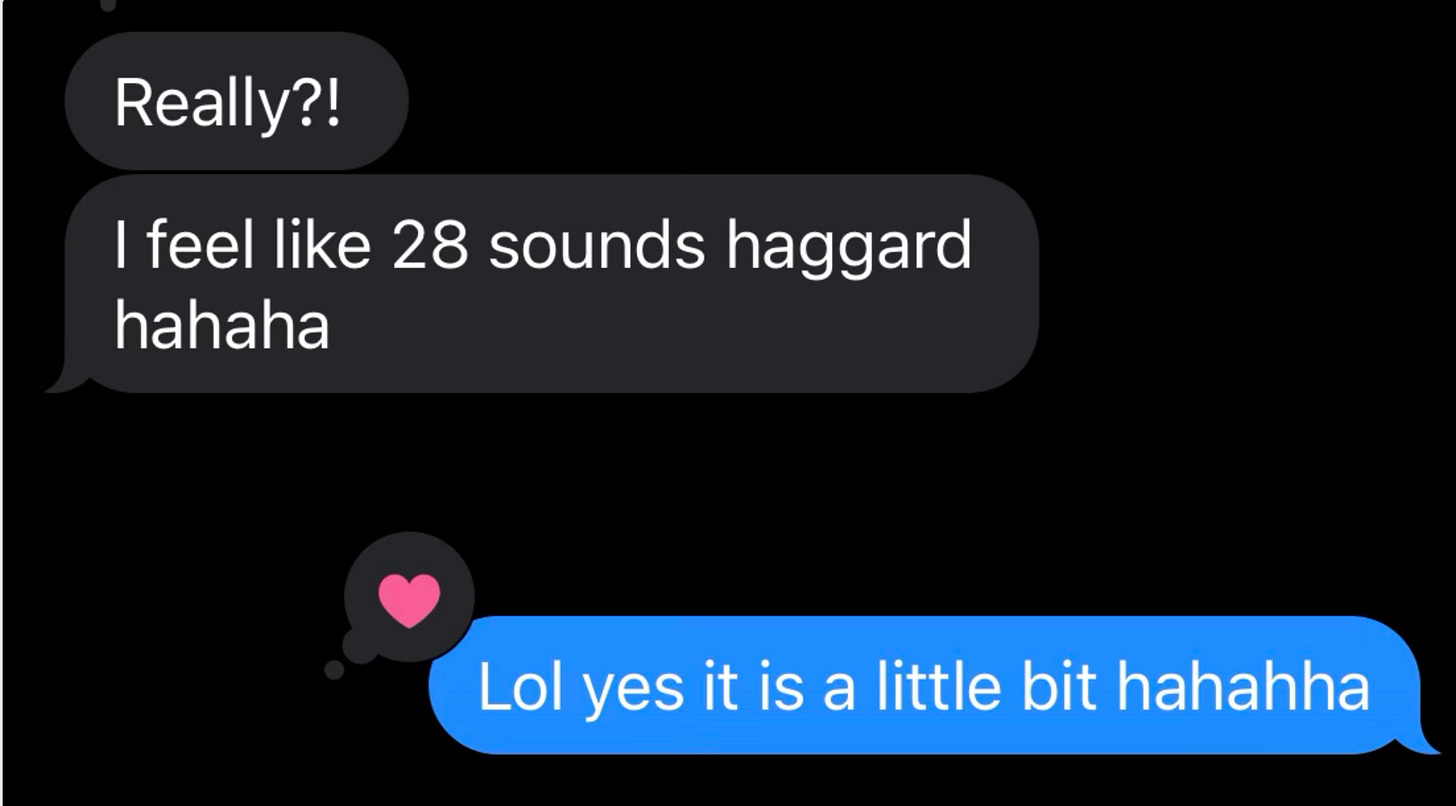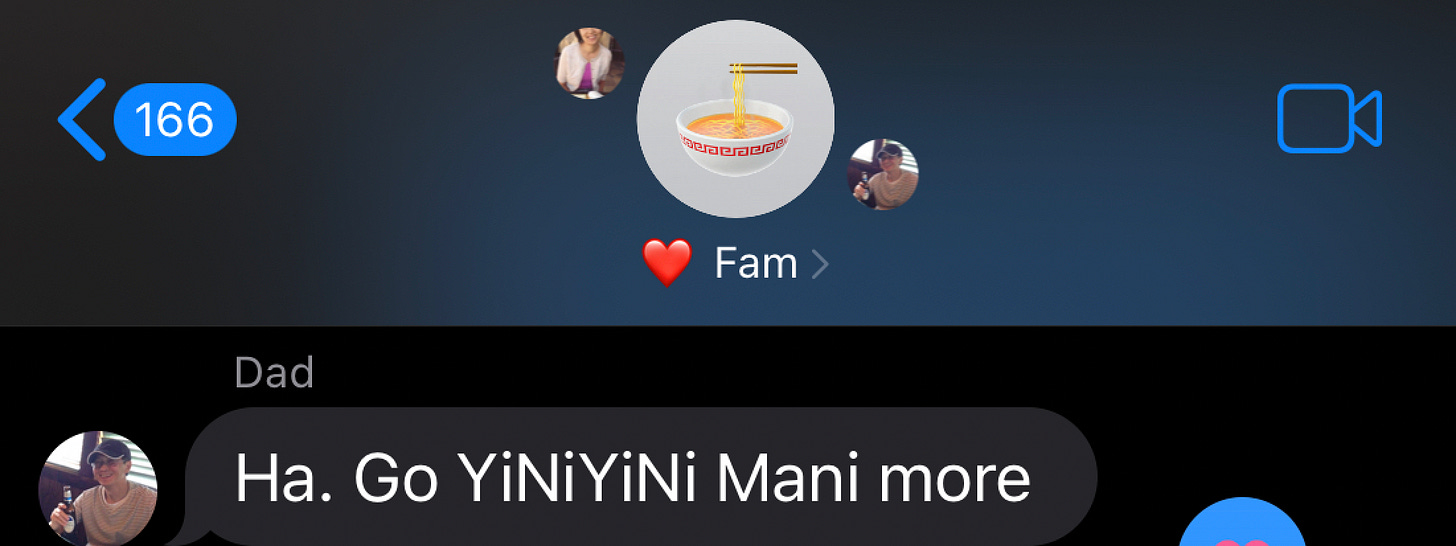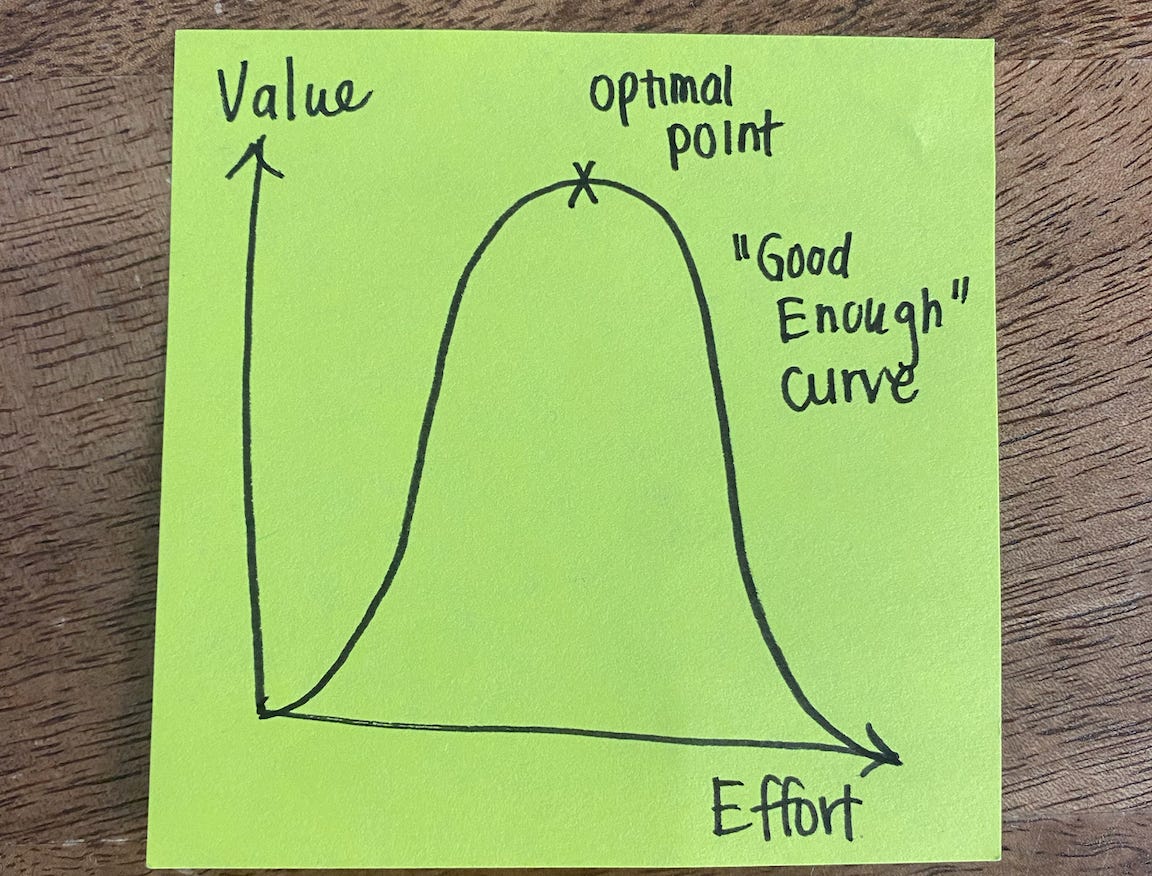hi there! i wrote this piece as a meditation on trying to teach myself to be less indecisive. there are somewhat spoilers of celine song’s “past lives” in this post so proceed with caution:)
There are a few times a year where I feel, viscerally, like time is running out. One is, tragically, new years eve, the inevitable birthday, then the sweet, waning last days of summer. I’ve talked a lot about my constant fight with the feeling that time is running out, but it feels particularly confronting when everywhere I look, people are bemoaning the end of summer.
Russell laments turning 28 to our table at indochine over lychee martinis. Everyone echoes that 28 sounds old, and I don’t disagree. When I was 24, I used to ask, what do people that are 28 even do for fun? Turns out, it’s the same sh*t you do when you’re 24 except you have marginally better taste and are infinitely more tired.
But we feel uniquely robbed because we went into the pandemic, young and vibrant and 24 year olds and came out decrepit and haggard and 28 year olds. There’s this feeling that we were screwed over because we lost the years we were supposed to be the hottest, the most energized. There is so much we could have done, so much that was taken from us that we can never get back.
We’re standing on Lafayette, saying our goodbyes when Ian picks me off my feet and announces his Uber is arriving. I ask what glamorous party he is going to. Home, he responds.
The truth is, all 6 of us are going to our respective little abodes, on Saturday night at 11pm no less. To be 28 in new york city
✦✧✦
Do you ever get bored, and just want to ruin your life for no reason?
I can’t help but wonder this as I walk into the movie theatre on West Houston for a noon screening. It’s been months since I first came across the trailer for Past Lives on the a24 page, but I know myself well enough to know it would wreck me. And Sunday sounds like a good day to ruin your life — it’s the last moments of the weekend after all.
106 minutes later, I exit the screening a puddle of tears and immediately beeline towards the bright blue bathroom stalls to gather myself. I don’t understand why she didn’t get with him that first time 12 years ago. I overhear a girl saying to her friend. I feel like it could’ve worked out then, before she met her husband.
It’s the obvious, tantalizing trap — solving for the what-could-have-beens — that makes the film so gut-wrenchingly devastating.
✧✦✦
The more that I feel like time is running out, the more I find myself wasting time. I wake up at 6am sometimes on a saturday, but end up dawdling around until noon.
I say to myself, this is perfect day to write at a cafe. But turns out the little french place I’ve picked doesn’t allow laptops so I find myself drinking an iced americano looking out onto Bank street. It feels like measured preparation, but tastes like procrastination.
✦✧✦
So much of Past Lives takes place in the negative spaces: long, protracted silences where things are left unsaid and raw, poignant conversations, backlit by the brightness of the day. The entire movie is spent in yearning, for things not said and paths not taken, that the life that Nora lives today seems unsettlingly mundane in comparison.
The idea of missing out on something great by settling for something good is one that I am constantly struggling with. I want everything in my life to be great. Not even great, but the best. I am a glutton for optimization. I want the best friends, the best job, the best apartment, the best blog. I have always thought that it was because I had high standards, but the other side of aiming for the best is that you’re always left wanting.
My parents always gave me sh*t for never being able to make a decision. My mom says it’s cause I don’t have any conviction and my dad say it’s a matter of time before I pull out the eenie meenie game.
✧✧✦
A commonly studied idea in behavioral economics is the difference between a maximizer (solving for the perfect outcome) and a satisfier (solving for good enough outcome). I’ve realized that the problem with maximizing everything is that you’re chasing an optimal outcome that is in some ways impossible to reach. And then whatever outcome you choose always comes with the prescribed dose of buyers remorse, as you’re plagued by the fear that you’ve made the wrong choice. Chase perfection and you will always end up second guessing yourself.
The part that gets me is that the research suggests that the maximizer ostensibly makes better choices but still ends up more unhappy. How cruel that you spend more time and more energy trying and you end up worse off than the kid skating by the seat of his pants.
This paradox can make innocuous situations unnecessarily stressful (e.g. every time I go to the nail salon I get anxious because I am stressed I’m not choosing the ‘right’ nail color), but for the consequential decisions it can trap you into a cycle of perpetual dissatisfaction.
Take dating in nyc — if you think about dating as a continuous cycle of information gathering on your partner, you will inevitably come across information that you don’t like. Some of these things are rightfully deal-breakers while others are just things you wish you didn’t have to deal with (but can probably live with). And while a rational person can in a vacuum evaluate whether to stay in a 1-to-3-month-old relationship, in reality — knowing that you haven’t yet deleted Hinge and have thousands of potentially perfect matches that are perennially just one swipe away, makes it incredibly easy to tap out at the first signs of conflict rather than learning to compromise.
What I’m slowly reminding myself is that not every decision is one that needs to be optimized — my nail color, what I order at dinner, if I purchase the top or not — are all extremely inconsequential and easily reversible decisions that are not worth the energy to fret over. It silly that I order every entree like it’s my last meal on earth when it doesn’t really matter if I might have theoretically liked the salmon better than the sea bass. It is good enough to enjoy a good meal with someone I care about rather than stressing myself out over the “best possible meal”.
One helpful framework I’ve found is this concept my boss likes to call the “good enough curve”. It’s a standard bell curve, where after a certain point, the more effort you put in, the less value you end up getting for that additional effort. The diminishing marginal returns build up to the point where you reach negative returns because you’re essentially wasting time. Going back and forth on what I want to order, waiting for the perfect moment to start writing, re-writing the email for the 5th time, are different sides of the same coin.
✧✦✧
There’s a scene in Past Lives that I can’t stop thinking about where Nora is in bed with her husband. They’re both writers, and he comments that her history with Hae Sung makes such a great story — the long, lost childhood friends from home finally reunited overseas. By contrast, Nora and her husband’s story, is a series of arbitrary meetings, green card laden logistics, and plain shared interests.
Is this the life you had imagined for yourself when you left Korea? he asks her (anxious attachment style lol).
She responds, this is her life, and this is where she is meant to be.
What I learned from Past Lives is that I am too often contorting myself into solving problems that have no solution, or don’t really even matter. There is happiness found in letting go of the what-could-have-beens and satisfying yourself with the present. It is a daily practice of just existing, being fully present with where you are at this exact moment — knowing that what you have now is where you are meant to be.











so what is a girl right in between the two ages at 26 to do in nyc when life feels repetitive and tedious.. asking for a friend..
past lives.. what a film.